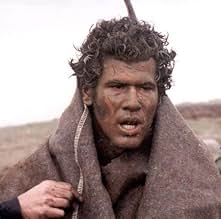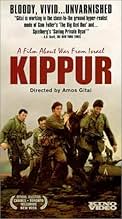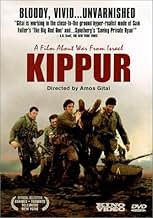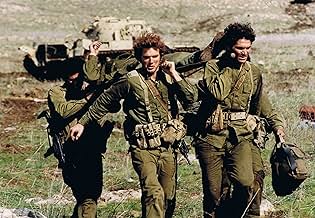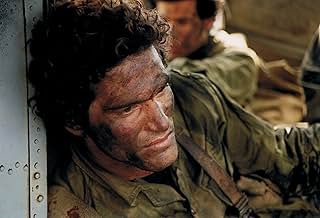IMDb-BEWERTUNG
6,3/10
2005
IHRE BEWERTUNG
Füge eine Handlung in deiner Sprache hinzuWhen the Yom Kippur War breaks out, two Israeli soldiers find themselves unable to locate their unit. Eager to take part in the war effort, they join an airborne medical evacuation unit.When the Yom Kippur War breaks out, two Israeli soldiers find themselves unable to locate their unit. Eager to take part in the war effort, they join an airborne medical evacuation unit.When the Yom Kippur War breaks out, two Israeli soldiers find themselves unable to locate their unit. Eager to take part in the war effort, they join an airborne medical evacuation unit.
- Auszeichnungen
- 2 Gewinne & 6 Nominierungen insgesamt
Uri Klauzner
- Dr. Klausner
- (as Uri Ran-Klausner)
Juliano Mer-Khamis
- The Captain
- (as Juliano Mer)
Liat Glick
- Dina
- (as Liat Glick Levo)
Noah Faran
- Rescue Commander
- (as Noach Faran)
Empfohlene Bewertungen
The Yom Kippur war almost caught Israel unawares. Twenty days later they were across the Suez 100km from Cairo and near as many from Damascus, another disaster for the Arabs. In a strange turn of events however, the surprise attack and doom-laden buildup to it, with thousands of graves dug in anticipation, had a devastating effect on the country, in effect signaling a perpetual state of fear and alert.
I am in the middle of exploring through films these bumps in the national mind, which brought me here. For what it's worth, the filmmaker has decided to capture an experience of war as purely about what it means to be there as he can. He knows, he was there.
Sadly, it's flat beyond belief. For better or worse I found it to be nothing like Thin Red Line, as others have mentioned in their comments. Whereas Malick spins war to be one of conflicting urges in the soul, this is what we see, two hours of med- evacs carrying the wounded.
There's one contemplative image in the film, a helo shot of a muddy battlefield with maneuvering tanks drawing meaningless patterns on the mud, contrasted with the early shot of the lush mingling of painted sex evocative of life, color, imagination, spontaneity. It's a great shot, and perfectly describes both what the film wants to portray, a sort of aimless cosmos, and what it ends up with—aimless doodling on the ground.
So the filmmaker reminisces in film about a time and place that allowed no skyward gaze. The important message is that war is as wasteful and pointless to happen in real life as it is to watch in this film.
I am in the middle of exploring through films these bumps in the national mind, which brought me here. For what it's worth, the filmmaker has decided to capture an experience of war as purely about what it means to be there as he can. He knows, he was there.
Sadly, it's flat beyond belief. For better or worse I found it to be nothing like Thin Red Line, as others have mentioned in their comments. Whereas Malick spins war to be one of conflicting urges in the soul, this is what we see, two hours of med- evacs carrying the wounded.
There's one contemplative image in the film, a helo shot of a muddy battlefield with maneuvering tanks drawing meaningless patterns on the mud, contrasted with the early shot of the lush mingling of painted sex evocative of life, color, imagination, spontaneity. It's a great shot, and perfectly describes both what the film wants to portray, a sort of aimless cosmos, and what it ends up with—aimless doodling on the ground.
So the filmmaker reminisces in film about a time and place that allowed no skyward gaze. The important message is that war is as wasteful and pointless to happen in real life as it is to watch in this film.
When the siren sounds the two main characters head off to do their part for the Israeli state. The bookends on the movie place the context of war as an eventuality that, like working, has to be done. The action doesn't take place at the front but with a medical evac unit who's cleaning up the wounded after the action has moved on. My two reasons for liking this film are the creative camera work and the battlefield sounds and visuals. Early in the film when they're looking for their unit they do accidentally drive right into the front lines and the viewer (camera) is placed right in the back seat of their Fiat as they scramble to get turned around. My one complaint. The characters lack development. Overall an enjoyable film.
Kippur (2000) Directed by Amos Gitai Starring: Liron Levo, Tomer Russo, Uri Klausner, Yoram Hattab, and Guy Amir ***1/2 out of 5 stars
Forgive me if I see the good in everything, but I believe that this Israel film, which features excruciatingly long takes and little dialogue, DOES have some deep significance. However, the long takes ARE draining, yet when you realize the purpose, it all seems to make sense.
Based on Israeli filmmaker Amos Gitai's personal experiences in the Yom Kippur war in 1973, in which Egyptian and Syrian forces attacked Israel on their holy day of Yom Kippur, "Kippur" follows a search and rescue team of four people as they travel by helicopter to different war-torn areas to find as many people alive as possible and bring them to some sort of safety and medical treatment. The film begins with two characters, Ruso (Yes, Russo) and Weinraub (Levo), who find themselves abruptly trying to get into a war. One of the characters (Ruso, I believe) is eager to get to the battlefront, proclaiming that a war has finally reached their generation and that "it is ours!". You must understand that Israel has been going through a war at least once, if not twice a decade. So, war, to the naive, inexperience individual, seems like a rite of passage.
Ruso and Weinraub, after awkwardly entering the front lines and being told to go back as shells are heard closeby, stop on the side and meet up with Gadassi (Amir), a medical officer trying to find a ride to the mission briefing. When they finally get to the battlefield to start the search and rescue, you soon find out that the film is about the death, detachment, and irrationality of war. What began as a rite of passage for the characters ended up being a strange, tortured nightmare. They go from area to area finding amputees and dead soldiers, usually unable to help all and having to leave much of the bodies on the battlefield. One torturous take follows the four characters as they try to help a soldier, who is hurt and obviously alive, out of a big field of mud. As they fall and slip, the soldier's body is thrown around, unintentionally carelessly. The frustration takes over one of the soldiers helping him as he breaks down in the middle of the mud and the doctor is going back and forth trying to calm the panicking soldier and help the injured one. When they finally make it to some other officers waiting for them to take the soldier away, he is already dead and the helplessness on the soldier's muddy faces says it all.
This film can be and will be very draining for most viewers. The long takes and the often far away framing distances ourselves from the action and you should soon learn to explore and examine what Gitai is trying to convey through the characters' stories. The film DOES build up to a briefly explosive climax, which poetically brings everything full circle for the soldiers. "Kippur" is a difficult film appropriate for its difficult subject. It is also daring, unwavering in its message, and, most importantly, truthful to the nonsense that war really is.
Forgive me if I see the good in everything, but I believe that this Israel film, which features excruciatingly long takes and little dialogue, DOES have some deep significance. However, the long takes ARE draining, yet when you realize the purpose, it all seems to make sense.
Based on Israeli filmmaker Amos Gitai's personal experiences in the Yom Kippur war in 1973, in which Egyptian and Syrian forces attacked Israel on their holy day of Yom Kippur, "Kippur" follows a search and rescue team of four people as they travel by helicopter to different war-torn areas to find as many people alive as possible and bring them to some sort of safety and medical treatment. The film begins with two characters, Ruso (Yes, Russo) and Weinraub (Levo), who find themselves abruptly trying to get into a war. One of the characters (Ruso, I believe) is eager to get to the battlefront, proclaiming that a war has finally reached their generation and that "it is ours!". You must understand that Israel has been going through a war at least once, if not twice a decade. So, war, to the naive, inexperience individual, seems like a rite of passage.
Ruso and Weinraub, after awkwardly entering the front lines and being told to go back as shells are heard closeby, stop on the side and meet up with Gadassi (Amir), a medical officer trying to find a ride to the mission briefing. When they finally get to the battlefield to start the search and rescue, you soon find out that the film is about the death, detachment, and irrationality of war. What began as a rite of passage for the characters ended up being a strange, tortured nightmare. They go from area to area finding amputees and dead soldiers, usually unable to help all and having to leave much of the bodies on the battlefield. One torturous take follows the four characters as they try to help a soldier, who is hurt and obviously alive, out of a big field of mud. As they fall and slip, the soldier's body is thrown around, unintentionally carelessly. The frustration takes over one of the soldiers helping him as he breaks down in the middle of the mud and the doctor is going back and forth trying to calm the panicking soldier and help the injured one. When they finally make it to some other officers waiting for them to take the soldier away, he is already dead and the helplessness on the soldier's muddy faces says it all.
This film can be and will be very draining for most viewers. The long takes and the often far away framing distances ourselves from the action and you should soon learn to explore and examine what Gitai is trying to convey through the characters' stories. The film DOES build up to a briefly explosive climax, which poetically brings everything full circle for the soldiers. "Kippur" is a difficult film appropriate for its difficult subject. It is also daring, unwavering in its message, and, most importantly, truthful to the nonsense that war really is.
Those here who have bashed the film have grossly misunderstood Kippur. Either they look for a blow-blam-bang Holy-wood flick, which it isn't; or for a highly reliable reconstruction (which Save Private Ryan, extolled by some, is only in part: the first scene is almost like-it-really-was, the last scene is blow-blam-bang with Matt Damon and Tom Hanks instead of Chuck Norris and Steven Seagal). Kippur is a highly personal film, in that war is filtered through the very personal point of view of a sophisticated director. Amos Gitai is close to Antonioni; and in directing a war movie he couldn't forget the Lesson of the Master. Hence the minimal dialogue, hence the dilated times, hence the attention to the setting more than the characters. You try to watch Deserto rosso and then Kippur and you'll notice just how much they have in common. Then, if you don't like Antonioni, it's your own business, go for the blow-blam-bang stuff. However, as for action movies, I think Black Hawk Down is better than SPR. I may be wrong...
This movie stunk. Scenes that go on and on without any life to it. The first ten minutes shows a couple making love, covered in paint on an art canvas. There is a man walking on an empty street and it goes on and on. Two lost soldiers are driving around for fifteen minutes trying to find their unit. Boring and dull. As for the biggest invasion in Israeli history, no one seems organized or even worried for that matter. The soldiers are not wearing combat helmets in a war zone and come across as dumb and dumber. As for the conversations, they are dull and listless, void of any emotion. Honestly, I found this whole movie unrealistic and totally boring. There isn't any type of character development and the viewer has no connection to any of the characters in the movie. I was hoping for a great film, but all I got was a snore bore. I give it a three only because of some effort from the main two characters. Don't waste your time on this junk.
Wusstest du schon
- WissenswertesThe film is based on director Amos Gitai's own experience of joining a helicopter rescue crew during the war of Kippur, and his helicopter being shot down by a Syrian missile on his 23rd birthday.
- PatzerMoshe Dayan did NOT lose his eye in the Sinai Desert; he lost it in Vichy-controlled Lebanon in 1941 on a reconnaissance mission on behalf of the Australian/British Army.
- VerbindungenFeatured in Sodankylä ikuisesti: Elokuvan vuosisata (2010)
Top-Auswahl
Melde dich zum Bewerten an und greife auf die Watchlist für personalisierte Empfehlungen zu.
- How long is Kippur?Powered by Alexa
Details
- Erscheinungsdatum
- Herkunftsländer
- Offizielle Standorte
- Sprachen
- Auch bekannt als
- Kippur
- Drehorte
- Nehushtan, Tel Aviv, Israel(studio: house interiors)
- Produktionsfirmen
- Weitere beteiligte Unternehmen bei IMDbPro anzeigen
Box Office
- Bruttoertrag in den USA und Kanada
- 114.283 $
- Eröffnungswochenende in den USA und in Kanada
- 17.007 $
- 5. Nov. 2000
- Weltweiter Bruttoertrag
- 114.283 $
- Laufzeit
- 1 Std. 57 Min.(117 min)
- Farbe
- Sound-Mix
- Seitenverhältnis
- 1.85 : 1
Zu dieser Seite beitragen
Bearbeitung vorschlagen oder fehlenden Inhalt hinzufügen


